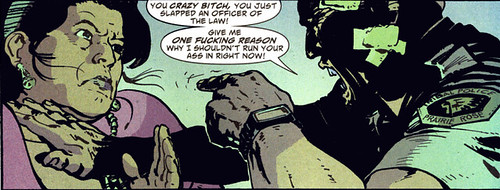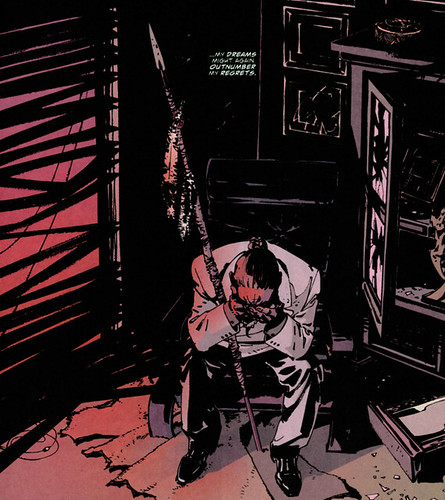I just read all 20 issues of Scalped (by Jason Aaron and R. M. Guera) on my vacation, and it's just blown me away. I think this is one of the very best comic series I've ever read. I'll not only put it up against any standard superhero fare (slightly unfair as this is a different genre), but I think it is just as layered and thorough as HBO's The Wire.
Here's why it's good to do both creator owned work as well as working on company owned characters from Marvel and DC. Simply put, I had never heard of Jason Aaron until I read his Wolverine story that Howard Chaykin drew a year or so ago. Then when took over Ghost Rider and revitalized that series, I realized I needed to read other things he's written. Scalped was on my to-read pile for a while, but now that I've finally discovered it, you had better believe it will be the first thing I read the week it comes out.
Scalped takes place in the modern era on the Prairie Rose Indian Reservation in South Dakota. The Rez, as it's called, is just as much a character in this series as Baltimore was in The Wire. The main character, Dashiell Bad Horse, is an Indian who grew up on the Rez, but was lucky enough to escape. The last thing he ever wanted was to come back, but he's pulled back by his FBI supervisors, who want to collect evidence on Chief Lincoln Red Crow. Red Crow, at first glance, seems like an Indian version of the Kingpin, running the Rez with a crooked backhand, heavily involved in building a new tribal casino. His daughter, Carol, is coked out waitress who despises her father, but has a thing for Bad Horse. Which is too bad, because all Bad Horse (who despises being an Indian) wants to do is to get the goods on Red Crow and get the hell out of town.
I had the same feeling reading the first couple of issues of Scalped that I had watching the first few hours of The Wire. Huh? This is good? It's a slow burn. At first glance, you think you have all these characters pegged. Red Horse is a Kingpin archetype, Bad Horse is a Daredevil archetype, and this is how it will play out. But it doesn't. There's a constant stream of flashbacks in each issue which unravels more depths to each character. We travel back to the 1970s to see Red Horse and Gina (Red Horse's mother) fighting against FBI agents, triggering a grudge that haunts them 35 years later. Carol, who appears to be a tramp, is later revealed to have very good reasons for her behavior. We get to know Bad Horse's mother Gina in a more intimate way than he ever could, by witnessing her actions in the 70s and her involvement in various activist groups. Aaron's done a great deal of research on the events of the 70s, Indian history, and reservation life to such an extent that I think he must be part of the Oglala tribe.
This is just part of the rich background, there's also plenty of action in Scalped. Bad Horse is a bad ass cop (working undercover in Red Horse's Rez police force) who carries a gun and a pair of nunchuks. He's described as a one man SWAT team who charges into dangerous situations and comes out alive. He's not invincible, doesn't have any super powers, and gets his ass kicked a lot in turn. About the most mystical thing to happen in the series so far is a dream that tells Bad Horse he will one day be a great leader of his people, but he will have to withstand terrible things first. I think we get an inkling of that at the end of Scalped #20.
R. M. Guera's artwork is a beautiful match for Aaron's writing. He wrings a lot of emotion out of the quiet scenes, like the one above where Red Horse falls apart the night his casino finally opens. It's an interesting touch that Guera and Aaron both usually put their signature on one page of each issue, which is a very European touch.
If there's any downside to Scalped, it's probably that for many people, it's better to read this in trade paperback. There's a constant shifting of time in each issue, and there is a series of small details that don't seem important, but add up later on. For instance, in issue #7, during the night of the casino grand opening, someone tells Red Horse that Merle Haggard's bus was stolen. It's a bit amusing, but this really makes an impact if you read issue #8 right afterward, because you learn who stole the bus.
If you haven't read this book and it sounds appealing to you, please go out and buy the first trade paperback now. I doubt you will be disappointed. Nuff said.
Link: Scalped Vol. 1: Indian Country



No comments:
Post a Comment